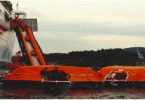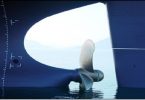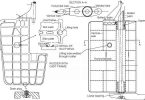AMENDMENTS TO THE GUIDELINES FOR THE DEVELOPMENT OF SHIPBOARD OIL POLLUTION EMERGENCY PLANS
FOREWORD
The International Convention for the Prevention of Pollution from Ships, 1973, as modified by the Protocol of 1978 relating thereto (MARPOL 73/78) is a principal instrument established by IMO for preventing marine pollution. Regulation 26 of Annex I of this Convention requires that every oil tanker of 150 tons gross tonnage and above and every ship other than an oil tanker of 400 tons gross tonnage and above shall carry on board a shipboard oil pollution emergency plan approved by the Administration. It is pertinent to note that MARPOL 73/78 was amended to include the above-mentioned regulation 26 of Annex I as a consequence of article 3(1)(a) of the International Convention on Oil Pollution Preparedness, Response and Co-operation, 1990 (OPRC Convention). This Convention contains a requirement that certain ships have on board a shipboard oil pollution emergency plan. The shipboard plan required under regulation 26 of Annex I of MARPOL 73/78 is the same shipboard oil pollution emergency plan that is required under article 3(1)(a) of the OPRC Convention.
Regulation 16 of Annex II of the Convention requires that every ship of 150 tons gross tonnage and above certified to carry noxious liquid substances in bulk shall carry on board a shipboard marine pollution emergency plan for noxious liquid substances approved by the Administration. A shipboard marine pollution emergency plan for noxious liquid substances should be combined with a shipboard oil pollution emergency plan since most of their contents are the same and only one combined plan on board is more practical than two separate plans in case of an emergency. In this case the title of such a combined plan should be “Shipboard marine pollution emergency plan” in order to distinguish it from a shipboard marine emergency plan for noxious liquid substances and a shipboard oil pollution emergency plan. Both regulation 26 of Annex I and regulation 16 of Annex II require that the plans be in accordance with guidelines developed by IMO.
The Marine Environment Protection Committee (MEPC) at its thirty-second session adopted Guidelines for the development of shipboard oil pollution emergency plans under cover of resolution MEPC.54(32) to meet the requirements of regulation 26 of Annex I.
The MEPC at its [forty-fourth] session prepared Guidelines for the development of shipboard marine pollution emergency plans to meet requirements of regulation 26 of Annex I and/or regulation 16 of Annex II on the basis of the Guidelines for oil. As a result of this review, the amendments to the Guidelines for the development of shipboard oil pollution emergency plans were also prepared by the MEPC at the same session to ensure uniform application of these regulations and guidelines.
It is also pertinent to note that shipboard oil pollution emergency plans which have already been approved by the Administration for oil tankers of 150 tons gross tonnage and above and ships other than oil tankers of 400 tons gross tonnage and above in accordance with the Guidelines for the development of shipboard oil pollution emergency plans adopted by resolution MEPC.54 (32) need not be modified in accordance with either these Guidelines or the Guidelines for the development of shipboard marine pollution emergency plans for oil and/or noxious liquid substances adopted by resolution MEPC.
Under the provisions of article 5 of the 1973 MARPOL Convention, a ship is required to hold a certificate in accordance with the provisions of regulations and, while in the ports or offshore terminals under the jurisdiction of a Party, is subject to inspection by officers duly authorized by that Party. In this context, the carriage of a shipboard oil pollution emergency plan should also be subject to such inspection.
These Guidelines contain information for the preparation of shipboard oil pollution emergency plans.




